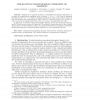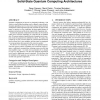146
click to vote
FOCS
1998
IEEE
15 years 6 months ago
1998
IEEE
We examine the number T of queries that a quantum network requires to compute several Boolean functions on f0;1gN in the black-box model. We show that, in the blackbox model, the ...
113
click to vote
FOCS
1998
IEEE
15 years 6 months ago
1998
IEEE
Sampling is an important primitive in probabilistic and quantum algorithms. In the spirit of communication complexity, given a function f : X
130
click to vote
COCO
2001
Springer
15 years 6 months ago
2001
Springer
Motivated by recent work on quantum black-box query complexity, we consider quantum versions of two wellstudied models of learning Boolean functions: Angluin’s model of exact le...
106
click to vote
ISAAC
2003
Springer
15 years 7 months ago
2003
Springer
This paper introduces quantum “multiple-Merlin”-Arthur proof systems in which Arthur receives multiple quantum proofs that are unentangled with each other. Although classical ...
108
Voted
ICALP
2003
Springer
15 years 7 months ago
2003
Springer
Suppose we have n algorithms, quantum or classical, each computing some bit-value with bounded error probability. We describe a quantum algorithm that uses O( √ n) repetitions of...
138
Voted
SPAA
2003
ACM
15 years 7 months ago
2003
ACM
Quantum computation has become an intriguing technology with which to attack difficult problems and to enhance system security. Quantum algorithms, however, have been analyzed un...
133
click to vote
ISCAS
2003
IEEE
15 years 7 months ago
2003
IEEE
A high-speed and large-scale processor dedicated to quantum computing is proposed, which has the minimum operation function needed for execution of a quantum algorithm. In this pr...
100
Voted
ISCA
2003
IEEE
15 years 7 months ago
2003
IEEE
As quantum computing moves closer to reality the need for basic architectural studies becomes more pressing. Quantum wires, which transport quantum data, will be a fundamental com...
128
click to vote
TCC
2004
Springer
15 years 7 months ago
2004
Springer
Quantum 2-party cryptography differs from its classical counterpart in at least one important way: Given blak-box access to a perfect commitment scheme there exists a secure 1−2...
163
click to vote
JELIA
2004
Springer
15 years 7 months ago
2004
Springer
Abstract. A new logic is proposed for reasoning about quantum systems. The logic embodies the postulates of quantum physics and it was designed from the semantics upwards by identi...


